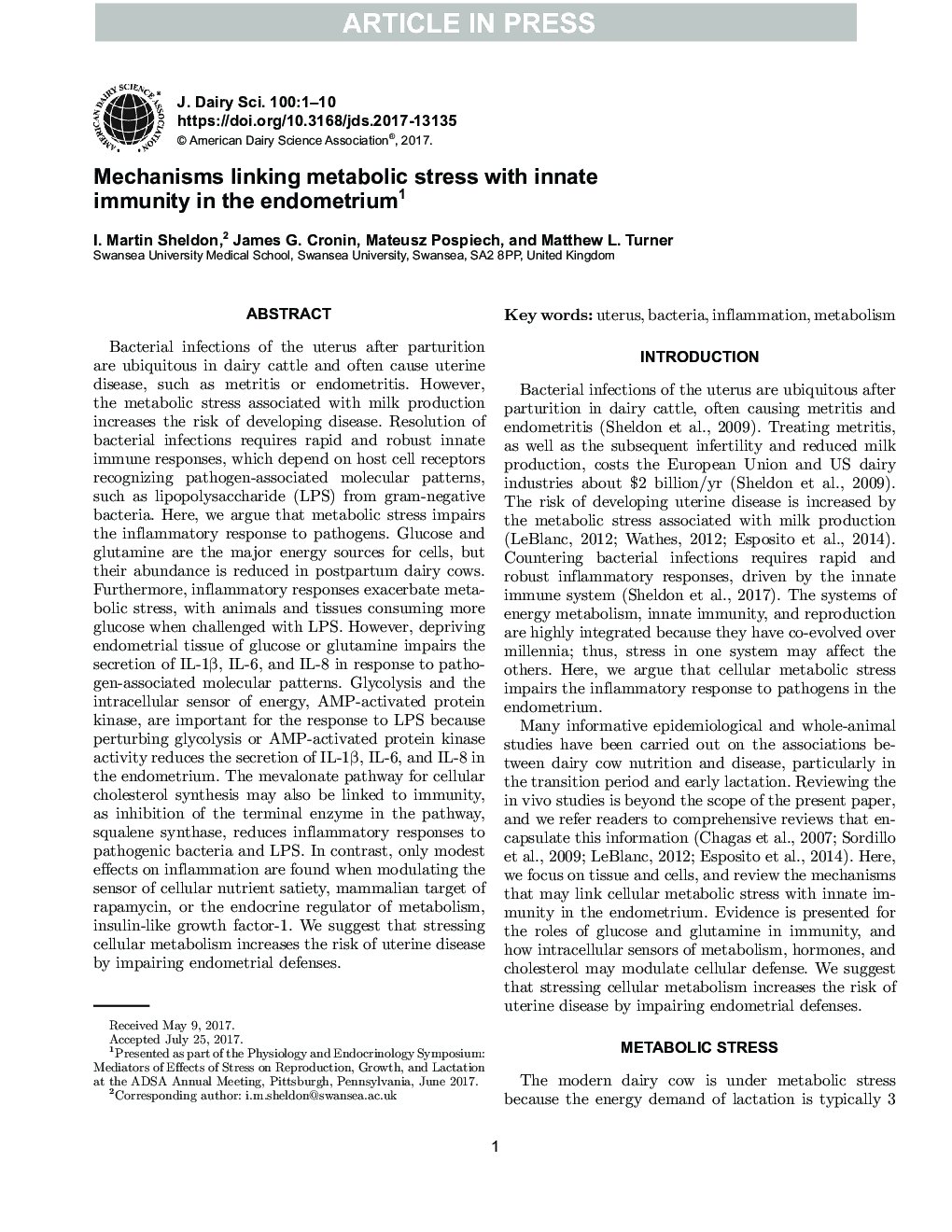| کد مقاله | کد نشریه | سال انتشار | مقاله انگلیسی | نسخه تمام متن |
|---|---|---|---|---|
| 8501536 | 1553841 | 2018 | 10 صفحه PDF | دانلود رایگان |
عنوان انگلیسی مقاله ISI
Symposium review: Mechanisms linking metabolic stress with innate immunity in the endometrium1
ترجمه فارسی عنوان
بررسی سمپوزیوم: مکانیسم هایی که باعث ایجاد استرس متابولیک با ایمنی ذاتی در اندومتر می شوند
دانلود مقاله + سفارش ترجمه
دانلود مقاله ISI انگلیسی
رایگان برای ایرانیان
کلمات کلیدی
رحم، باکتری ها، التهاب متابولیسم
موضوعات مرتبط
علوم زیستی و بیوفناوری
علوم کشاورزی و بیولوژیک
علوم دامی و جانورشناسی
چکیده انگلیسی
Bacterial infections of the uterus after parturition are ubiquitous in dairy cattle and often cause uterine disease, such as metritis or endometritis. However, the metabolic stress associated with milk production increases the risk of developing disease. Resolution of bacterial infections requires rapid and robust innate immune responses, which depend on host cell receptors recognizing pathogen-associated molecular patterns, such as lipopolysaccharide (LPS) from gram-negative bacteria. Here, we argue that metabolic stress impairs the inflammatory response to pathogens. Glucose and glutamine are the major energy sources for cells, but their abundance is reduced in postpartum dairy cows. Furthermore, inflammatory responses exacerbate metabolic stress, with animals and tissues consuming more glucose when challenged with LPS. However, depriving endometrial tissue of glucose or glutamine impairs the secretion of IL-1β, IL-6, and IL-8 in response to pathogen-associated molecular patterns. Glycolysis and the intracellular sensor of energy, AMP-activated protein kinase, are important for the response to LPS because perturbing glycolysis or AMP-activated protein kinase activity reduces the secretion of IL-1β, IL-6, and IL-8 in the endometrium. The mevalonate pathway for cellular cholesterol synthesis may also be linked to immunity, as inhibition of the terminal enzyme in the pathway, squalene synthase, reduces inflammatory responses to pathogenic bacteria and LPS. In contrast, only modest effects on inflammation are found when modulating the sensor of cellular nutrient satiety, mammalian target of rapamycin, or the endocrine regulator of metabolism, insulin-like growth factor-1. We suggest that stressing cellular metabolism increases the risk of uterine disease by impairing endometrial defenses.
ناشر
Database: Elsevier - ScienceDirect (ساینس دایرکت)
Journal: Journal of Dairy Science - Volume 101, Issue 4, April 2018, Pages 3655-3664
Journal: Journal of Dairy Science - Volume 101, Issue 4, April 2018, Pages 3655-3664
نویسندگان
I. Martin Sheldon, James G. Cronin, Mateusz Pospiech, Matthew L. Turner,
